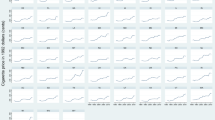Abstract
In this paper, we sustain that non-smokers who might be at risk of starting to smoke or relapsing can benefit from anti-smoking policies such as tax hikes and smoking bans because these are mechanisms that enhance their self-control with regard to tobacco consumption. We formalize this conjecture by proposing a model where starting/relapsing might result from time inconsistent preferences in a way that mirrors the inability of some smokers to carry out the decision to quit. Subsequently, we specify econometric models that allow us to test the implications of such conjecture using information on smoking behavior at the individual level from the Catalan Health Survey of 2006. The empirical results support our conjecture and suggest that the welfare gains derived from the reinforcement of self-control caused by tax hikes and smoking bans will accrue not only to smokers but also to the rest of the population.
Similar content being viewed by others
Notes
But note that this framework also highlights the potential of reducing the disutility of quitting, i.e., increasing Q, by means of quitting aids such as nicotine patches etc.
References
Becker, G., Murphy, K.: A theory of rational addiction. J. Polit. Econ. 96, 675–700 (1988)
Bernheim, D., Rangel, A.: Behavioural public economics: welfare and policy analysis with nonstandard decision markers. In: Dianmond, P., Vartiannen, H. (eds.) Behavioural economics and its applications. Princeton University Press, Princeton (2007)
Strotz, R.H.: Myopia and inconsistency in dynamic utility maximization. Rev. Econ. Stud. 23, 165–180 (1956)
Phelps, E.S., Pollak, R.A.: On second best national saving and game—theoretic growth. Rev. Econ. Stud. 35, 185–199 (1968)
Laibson, D.: Golden eggs and hyperbolic discounting. Q. J. Econ. 112, 443–477 (1997)
O’Donoghue, T., Rabin, M.: Addiction and self-control. In: Elster, J. (ed.) Addiction: entries and exits, pp. 169–206. Russell Sage Foundation, New York (1999)
Gruber, J., Köszegi, B.: Is addiction “rational”? Theory and evidence. Q. J. Econ. 116, 1261–1303 (2001)
Gruber, J., Köszegi, B.: A theory of government regulation of addictive bads: optimal tax levels and tax incidence for cigarette taxation. National Bureau of Economic Research. Working Paper 8777 (2002)
Gruber, J., Köszegi, B.: Tax incidence when individuals are time-inconsistent: the case of cigarette excise taxes. J. Public Econ. 88, 1959–1987 (2004)
Herscht, J.: Smoking restrictions as a self-control mechanism. J. Risk Uncertain. 31, 5–21 (2005)
Kan, K.: Cigarette smoking and self-control. J. Health Econ. 26, 61–81 (2007)
Gruber, J., Mullainathan, S.: Do cigarette taxes make smokers happier? Adv. Econ. Anal. Policy 5(1), Article 4 (2005)
Orphanides, A., Zervos, D.: Rational addiction with learning and regret. J. Polit. Econ. 103, 739–758 (1995)
Wang, R.: The optimal consumption and the quitting of harmful addictive goods. B.E. J. Econ. Anal. Policy 7(1), article 15 (2007)
Villalbí, J.R., Baranda, L., Lopez, M.J., Nebot, M.: El tabaco en los establecimientos de restauración y hostelería: estudio observacional en Barcelona. Gac. Sanit. 24(1), 72–74 (2010)
Grupo de trabajo sobre tabaquismo de la Sociedad Española de Epidemiología: Evaluación del impacto de la Ley de medidas sanitarias frente al tabaquismo. Prodisa, Barcelona (2009)
Bernheim, D., Rangel, A.: Addiction and cue-triggered decision processes. Am. Econ. Rev. 94(5), 1558–1590 (2004)
Sloan, F.A., Ostermann, J., Conover, C., Taylor, Jr., D.H., Picone, G.: The price of smoking. MIT Press, Cambridge (2004)
Acknowledgments
Support from Ministerio de Educación project ECO2008-06395-C05-04, co-funded by European Regional Development Fund, and from Fundación Séneca through project 08646/PHCS/08 is gratefully acknowledged. We also thank two anonymous referees for useful comments and suggestions. The usual disclaimer applies.
Author information
Authors and Affiliations
Corresponding author
Rights and permissions
About this article
Cite this article
Badillo Amador, L., López Nicolás, Á. Self-control and support for anti-smoking policies among smokers, ex smokers, and never smokers. Eur J Health Econ 14, 161–170 (2013). https://doi.org/10.1007/s10198-011-0356-5
Received:
Accepted:
Published:
Issue Date:
DOI: https://doi.org/10.1007/s10198-011-0356-5




